Dow Jones Plummets 634 Points Behind Investor Fear

The Dow Jones Industrial Average was rocked by investor fear on Monday, dropping 634 points during trading.
The loss was the sixth-worse ever for the Dow Jones, coming on the first day of trading since Standard & Poor's downgraded long-term United States debt on Friday night.
S&P downgraded the United States from AAA to AA+ rating, as well as downgrading many organizations associated with the United States on Monday, and the effects were quite apparent on Monday. S&P downgraded Freddie Mac, Fannie Mae, and Berkshire Hathaway, among other institutions.
The Dow dropped below the psychologically significant level of 11,000, losing more than 5.5 percent of its total index. Conversely, the VIX index, known as the primary gauge of investor fear, rose 47.4 percent.
The Dow finished at 10,809.85.
The Dow wasn't the only market to take a major beating though, as the S&P 500 and Nasdaq both suffered big losses. The S&P 500 posted its fourth worst point less ever on Monday. It dropped 6.65 percent, or 80 points, equaling its 10th worst percentage loss of all-time.
Nasdaq lost close to 7 percent of its index, checking in at 6.9 percent, and was down 174 points on the day.
"This is very heavy volume again and that tells me that we've got people liquidating to raise cash," Art Cashin, director of floor operations at UBS Financial Services told CNBC.
As investors continued to get out of stocks, they turned their attention to investing in commodities and U.S. Treasury bonds.
Gold saw its value rise 4.2 percent on Monday, while 10-year Treasury bonds traded at 2.36 percent yield on Monday, down from 2.56 percent value on Friday.
Bank of America Gets Rocked
One company that also saw its shares drop like a rock on Monday was banking giant Bank of America. The Charlotte-based company saw its stock drop over 20 percent after American International Group Inc. announced a $10 billion dollar lawsuit against the company.
The shares dropped to a $6.51, a loss of $1.66 on the day.
In the lawsuit, AIG hopes to recoup $10 billion out of an initial $28 billion dollar investment, in what some estimate as the largest mortgage security lawsuit filed by a single investor.
Bank of America responded strongly to AIG's lawsuit, claiming that AIG should be responsible for its own mistakes and that it was erroneous in alleging that Bank of America committed fraud.
"AIG recklessly chased high yields and profits throughout the mortgage and structured finance markets," said spokesman Lawrence Grayson. "It is the very definition of an informed, structured investor, with losses solely attributable to its own excesses and errors."
Bank of America also took a hit when hedge-fund investor David Tepper decided to sell his 17 million shares on Monday. Tepper, the manager of Appaloosa, had previously been bullish on Bank of America and other troubled banks, such as Wells Fargo, but now has cut ties to both.
© Copyright IBTimes 2025. All rights reserved.





















